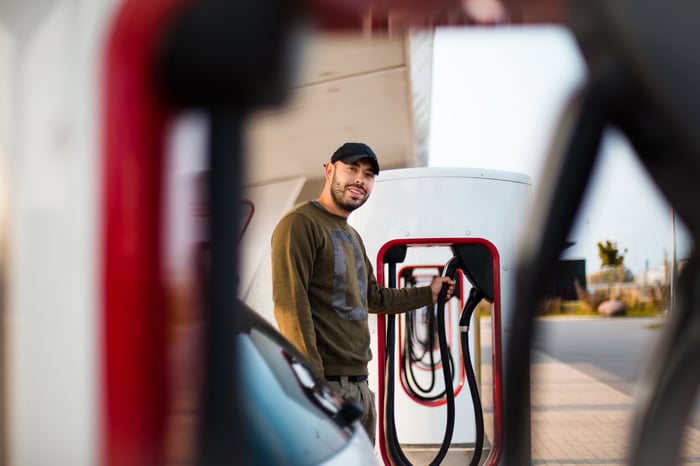Is Tesla Stock the Smartest Investment You Can Make Today?
Tesla's (NASDAQ: TSLA) stock is undoubtedly risky, but then again, so are many other stocks on the market, and there's no such thing as a reward without risk. The question is whether the risk/reward calculation makes sense for Tesla stock. Here's one view on matters.
Tesla looks and walks like a growth stock
It's easy to point at the stock's current valuation based on earnings, cash flow, and sales and quickly conclude that the stock is ridiculously overvalued. For example, here's a look at Tesla's enterprise value (market cap plus net debt) to earnings before interest, taxation, depreciation, and amortization (EBITDA) compared to other companies and another one of the so-called "Magnificent Seven" stocks, Google owner Alphabet (NASDAQ: GOOG)
Where to invest $1,000 right now? Our analyst team just revealed what they believe are the 10 best stocks to buy right now. Learn More »
There is no way around it -- Tesla's valuation as a car company alone doesn't add up.

TSLA EV to EBITDA data by YCharts.
That said, no one is -- or should be -- valuing Tesla only as a car company. The company’s investment appeal largely hinges on its robotaxi ambitions. For example, longtime Tesla bull ARK Invest projects a 2029 value of $2,600 per share, attributing just 9% of that (roughly $234) to the car business and 88% (roughly $2,288) to robotaxis.
Is Tesla a good value growth stock?
Whichever way you look at it, Tesla is being priced and should be judged as a growth stock set to launch a technology that could revolutionize its earnings. That's what Tesla is trying to do now with robotaxis and its unsupervised full-service-driving (FSD) solution.
Accepting that Tesla is a growth stock is one thing, but believing it's a decent value growth stock is another. It's definitely a speculative affair. After all, while management recently confirmed that it will sell unsupervised FSD on Model Y (any Tesla should be able to be converted into a robotaxi) in Austin in June, effectively a robotaxi and volume production of its dedicated robotaxi vehicle, Cybercab, will begin in 2026, there are still a host of unanswered questions around the technology.

Image source: Getty Images.
Developing robotaxis isn't easy
There are doubts about its commercial scalability, the regulatory environment, and Tesla's ability to deliver, not least as CEO Elon Musk has a history of being overly optimistic about FSD. He once humorously described himself as "the boy who cried FSD" on an earnings call in 2023.
That said, he's not the only one late on robotaxis. Back in 2016, Ford promised investors robotaxis by 2021 but has scaled back its plans since. Similarly, General Motors CEO Mary Barra told investors in January, "We expect to see a run rate savings of about $1 billion on an annualized basis by ending robotaxi development."
Reasons for optimism
That said, Tesla is not the usual growth stock. It's the established leader in the electric vehicle market, and its success allows it to build the scale to lower its cost per vehicle, enabling it to release cheaper models over time.
Furthermore, Waymo, Alphabet's self-driving car company, has offered commercial robotaxi services since 2018, proving the concept's viability and consumer acceptance. In addition, the idea of selling cars to use as robotaxis (a significant part of the case for Tesla) received some support from Alphabet CEO Sundar Pichai when he spoke of "future optionality around personal ownership as well."

Image source: Getty Images.
Moreover, competitors like Ford and General Motors dropping out of the robotaxi race helps de-risk Tesla from potential competition. Tesla is the leader in the EV market, and management believes its robotaxis will offer significant cost advantages over Waymo's service and the cars Waymo uses. It will also have significantly more data (gathered from Tesla cars) to enable FSD better.
Not the usual growth stock
Tesla stock is a speculative growth stock, but it's far less speculative than most growth stocks struggling to establish themselves in the marketplace, and doing so with weak finances and little market recognition -- the usual proposition you get when investing in growth stock. This is not a company struggling with financing and desperately trying to establish itself or get consumers to understand or use the concept of its offering.
Instead, it's the EV leader entering an already established and growing marketplace, threatening to do so with a significant cost advantage over Waymo. It's not the sort of stock to bet the farm on, as its robotaxi ambitions may well disappoint, but it deserves a place in a diversified growth investor's portfolio.
In that context, it is smart to invest in Tesla because it's a lot less risk for a lot more reward than many growth stocks on the market.
Suzanne Frey, an executive at Alphabet, is a member of The Motley Fool's board of directors. Lee Samaha has no position in any of the stocks mentioned. The Motley Fool has positions in and recommends Alphabet and Tesla. The Motley Fool recommends General Motors. The Motley Fool has a disclosure policy.